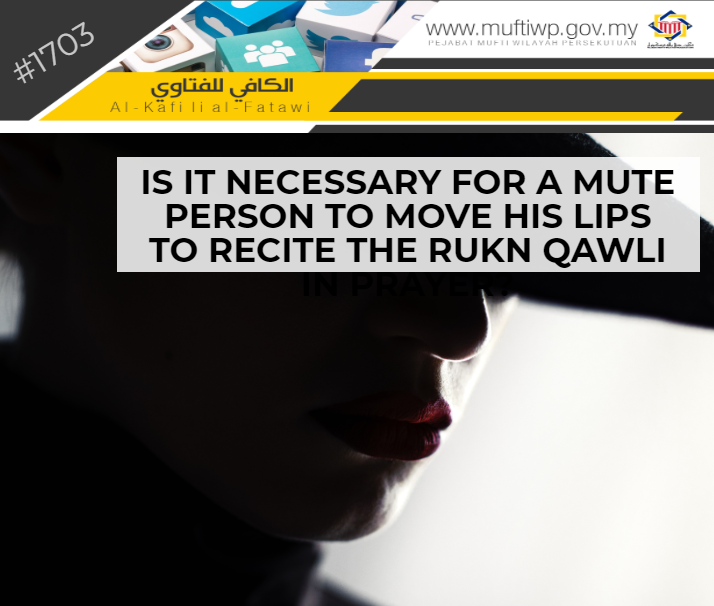Question:
Is it necessary for a mute person to move his lips when reciting the recitation of rukn qawli in prayer? Or is it enough to recite it in his heart only? Jazakallah khair.
Answer:
Alhamdulillah, praise and thanks to Allah for the countless blessings He has blessed us all with. Blessings and salutations to the Prophet Muhammad PBUH, his wives, his family, companions and all those that follow his teachings to the day of judgement.
Rukn Qawli in prayer
Rukn is divided into three which are rukn qalbi (heart), rukn qawli (utterance or recitation) and rukn fi’li (actions). Sheikh al-Sayid Abdullah al-Hadrami states in his book that:
القولية، وهي خمسة: تكبيرة الإحرام أول الصلاة، وقراءة الفاتحة في كل ركعة وقراءة التشهد والصلاة على النبي والسلام آخر الصلاة، ثلاثتها في القعدة الأخيرة
(Rukn) Qawliyah are five things: Takbiratul ihram on the start of prayer, reciting surah al-Fatihah on each rakaat, tasyahhud and salawat to the Prophet PBUH as well as give salam, these three are during the last sitting. (Refer Safinah al-Naja pg. 44)
So, its original rule is wajib to recite these rukn qawli, and the recitation should be heard by the one who recites it himself. Imam Abu Bakar al-Syato al-Dimyati said that: “(And it is wajib to hear) which is the takbiratul ihram by the one who performs the prayer himself, if his hearing is good and is not hindered by any hindrance like loud sound, (for all rukn qawli) from al-Fatihah, the last tasyahhud and salam.” (Refer I’anah al-Tolibin 3/295).
The recitation for mute people
However, Allah SWT will never command something beyond the capabilities of His servants. This is in accordance with the saying of Allah:
لَا يُكَلِّفُ اللَّـهُ نَفْسًا إِلَّا وُسْعَهَا
Allah does not charge a soul except [with that within] its capacity
Surah al-Baqarah (286)
The same for the saying of the Prophet PBUH:
فَإِذَا أَمَرْتُكُمْ بِشَىْءٍ فَأْتُوا مِنْهُ مَا اسْتَطَعْتُمْ وَإِذَا نَهَيْتُكُمْ عَنْ شَىْءٍ فَدَعُوهُ
So when I command you to do anything, do it as much as it lies in your power and when I forbid you to do anything, then abandon it.
Sahih Muslim (1337)
On this basis according to Imam al-Nawawi, the ashab of madhhab al-Shafi’e explain that a mute person just have to move his lips with the intention of reciting it enough to the rate for those who are able to recite move their lips. This ruling is applicable for the recitation of al-Fatihah, tasyahhud, salam and all recitations as well as dhikr during prayer. (Refer Al-Majmu’ Syarh al-Muhazzab 3/294 and 394-395).
While Dr. Muhammad al-Zuhaily said:
أن يسمع نفسه إذا كان صحيح السمع، ولا عارض عنده من لغط أو غيره، فإن كان بلسانه خبل (فساد) أو خرس، حرکه بما يقدر عليه، ويحرك شفتيه ولهاته بالتكبير بقدر الإمكان
He should hear (what he recites) by himself, if he has a good hearing, and there is no hindrance to the sound and etc. If he has a problem in words (uttering) or vocally impaired, then he should move his lips enough with what he is capable of. He should move both his lips and uvula within his capacity. (Refer al-Mu’tamad fi al-Mazhab al-Syafi’e 1/241).
However, it is explained by Imam al-Ramli and Imam al-Syarwani that this ruling is only applied to those who vocally impaired after losing their ability to speak before. While those vocally impaired since birth, then they are not obligated to move their lips as they are unable to move it according to the emission points (makharij al-huruf) and the manner of articulation (sifat al-huruf) for the Arabic alphabets. (Refer Nihayah al-Muhtaj ila Syarh al-Minhaj 1/463 and Hasyiyah al-Syarwani ‘ala Tuhfah al-Muhtaj 2/49)
Conclusion
Consequently, we state that for a mute person from birth, he is not obligated to move his lips when reciting the rukn qawli during prayer, and it is also not Sunnah for them to recite other Sunnah recitations.
While for one who becomes vocally impaired or experienced something that results in him losing his ability to speak, he is still obligated to move his lips when reciting the rukn qawli during prayer, and it is sunnah for them when he comes to the Sunnah recitations in prayer to recite it like those who are able to do so by moving their lips to recite it.
Wallahua’lam.
